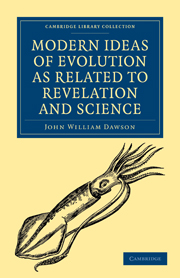Book contents
- Frontmatter
- PREFACE
- Contents
- CHAPTER I PRESENT ASPECTS OF THE QUESTION
- CHAPTER II WHAT IS EVOLUTION?
- CHAPTER III THE ORIGIN OF LIFE
- CHAPTER IV THE APPARITION OF SPECIES IN GEOLOGICAL TIME
- CHAPTER V MONISTIC EVOLUTION
- CHAPTER VI AGNOSTIC EVOLUTION
- CHAPTER VII THEISTIC EVOLUTION
- CHAPTER VIII GOD IN NATURE
- CHAPTER IX MAN IN NATURE
- CHAPTER X GENERAL CONCLUSIONS
- APPENDIX I WEISMANN ON HEREDITY
- APPENDIX II DR. McCOSH ON EVOLUTION
CHAPTER VI - AGNOSTIC EVOLUTION
Published online by Cambridge University Press: 29 August 2010
- Frontmatter
- PREFACE
- Contents
- CHAPTER I PRESENT ASPECTS OF THE QUESTION
- CHAPTER II WHAT IS EVOLUTION?
- CHAPTER III THE ORIGIN OF LIFE
- CHAPTER IV THE APPARITION OF SPECIES IN GEOLOGICAL TIME
- CHAPTER V MONISTIC EVOLUTION
- CHAPTER VI AGNOSTIC EVOLUTION
- CHAPTER VII THEISTIC EVOLUTION
- CHAPTER VIII GOD IN NATURE
- CHAPTER IX MAN IN NATURE
- CHAPTER X GENERAL CONCLUSIONS
- APPENDIX I WEISMANN ON HEREDITY
- APPENDIX II DR. McCOSH ON EVOLUTION
Summary
Between the position of the materialistic or energistic monist and that of the theist there are several stages of so-called agnosticism. The agnostic declines to be called an infidel or an atheist, yet in some respects he occupies a position more advanced than either, though expressed in a less offensive way. In the Christian or New Testament sense an infidel is merely one who has no faith in Jesus Christ as his Saviour. He may believe in a God or in many gods. An atheist may take the farther step of denying the existence of any god, but may still be open to argue on the subject. An agnostic may occupy a variety of positions between that of admitting the possibility or probability of a First Cause without committing himself to the doctrine of a personal or living God, and that of maintaining that it is impossible to have any knowledge of God, and thereby going beyond even the standpoint of the atheist. All varieties of the agnostic creed, or want of creed, necessarily agree in holding to the spontaneous evolution of the universe, so that practically agnosticism in some form and evolution are usually found together.
A recent explanation of Professor Huxley places agnosticism in the most favourable light in which it is possible to regard its tenets.
- Type
- Chapter
- Information
- Modern Ideas of Evolution as Related to Revelation and Science , pp. 151 - 161Publisher: Cambridge University PressPrint publication year: 2009First published in: 1890

